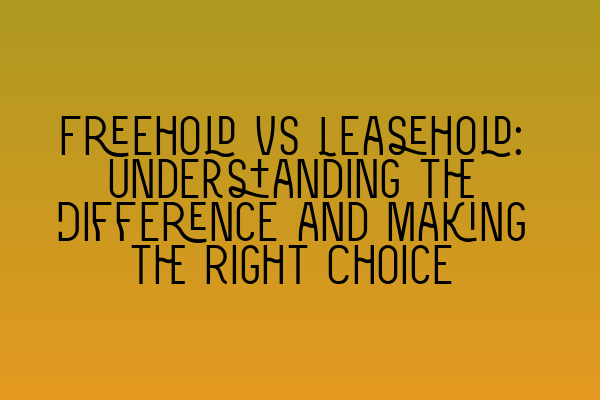When it comes to purchasing a property, one of the most important decisions you’ll need to make is whether to buy a freehold or leasehold property. Understanding the difference between these two types of ownership is crucial in order to make the right choice for your needs. In this article, we will explore the differences between freehold and leasehold properties, and provide you with the information you need to make an informed decision.
What is a Freehold Property?
A freehold property is one where you own the property and the land it is built on outright. This means that you have full ownership of both the property and the land, and you are not required to pay any ground rent or service charges to a landlord. Freehold properties are typically houses or bungalows, although some flats can also be sold as freehold.
There are several advantages to owning a freehold property. Firstly, you have complete ownership and control over the property, allowing you to make any alterations or improvements without obtaining permission from a landlord. Additionally, freehold properties tend to be more attractive to potential buyers, as there are no additional costs or restrictions associated with leasehold ownership.
However, it’s important to note that with freehold ownership also comes more responsibilities. You are responsible for maintaining and repairing the property, as well as any associated costs. This includes the maintenance of any shared areas or facilities, such as communal gardens or driveways if you live in a gated community.
If you are considering buying a freehold property, it’s essential to understand the legal implications and obligations that come with ownership. It is advisable to seek professional legal advice to ensure you fully understand your rights and responsibilities.
What is a Leasehold Property?
A leasehold property is one where you own the property but not the land it is built on. Instead, you enter into a lease agreement with the freeholder, which is usually for a specific number of years, typically between 99 and 999 years. During this period, you are considered the leaseholder and have certain rights and responsibilities.
Leasehold properties are typically flats or apartments, although some houses can also be sold as leasehold. When you purchase a leasehold property, you will be required to pay an annual ground rent to the freeholder, as well as potentially additional service charges for the maintenance of common areas and facilities. These costs can vary widely and should be considered as part of your overall budget.
One of the key advantages of leasehold ownership is that the freeholder is responsible for the maintenance and repair of the common areas and external structure of the property. This means that you are not solely responsible for these costs, which can potentially save you money in the long run.
However, leasehold ownership also comes with some restrictions. You are required to obtain permission from the freeholder for any major alterations or improvements to the property, such as adding an extension or changing the layout. Additionally, when the lease term comes to an end, ownership of the property reverts back to the freeholder. However, this can typically be extended through a lease extension or enfranchisement process.
Making the Right Choice
So, how do you determine whether freehold or leasehold ownership is the right choice for you? There are several factors to consider.
Firstly, think about your long-term plans for the property. If you are looking for a permanent home where you can make any changes you desire, then a freehold property may be the best option for you. However, if you are purchasing a property as an investment or for a shorter-term period, then a leasehold property could be more suitable.
Secondly, consider your budget. While leasehold properties may appear to be cheaper upfront, it’s essential to take into account the ongoing ground rent and service charges. These costs can vary greatly between properties, so it’s crucial to do your research and factor them into your budget.
Lastly, seek professional advice. Engaging the services of a qualified solicitor who specializes in property law can provide you with valuable insights and guidance. They will ensure that you fully understand the legal implications and obligations associated with both freehold and leasehold ownership, and help you navigate the purchasing process.
In conclusion, understanding the difference between freehold and leasehold properties is essential when making a decision on which type of ownership is right for you. Freehold properties offer complete ownership and control, while leasehold properties come with certain restrictions and ongoing costs. Consider your long-term plans, budget, and seek professional advice to make an informed choice. Remember, property ownership is a significant investment, so it’s important to get it right.
For further information on relevant topics, you can check out these related articles:
- Understanding Contractual Capacity: Rights and Limitations
- Interactive SQE Mock Tests for Contract Law: Test Your Knowledge
- Join Our SQE Contract Law Webinars: Expert Insights and Guidance
- SQE Prep: Mastering the Essentials of Contract Law
- Contractual Capacity: Understanding Legal Competence in Contracting Parties
